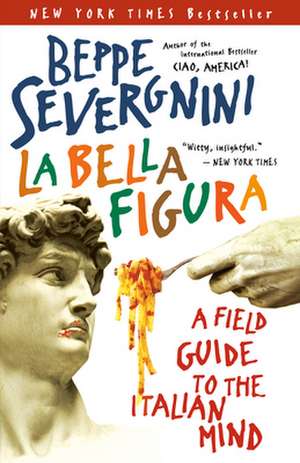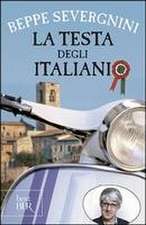La Bella Figura: A Field Guide to the Italian Mind
Autor Beppe Severgnini Traducere de Giles Watsonen Limba Engleză Paperback – 31 mai 2007
You won’t need luggage for this hypothetical and hilarious trip into the hearts and minds of Beppe Severgnini’s fellow Italians. In fact, Beppe would prefer if you left behind the baggage his crafty and elegant countrymen have smuggled into your subconscious. To get to his Italia, you’ll need to forget about your idealized notions of Italy. Although La Bella Figura will take you to legendary cities and scenic regions, your real destinations are the places where Italians are at their best, worst, and most authentic:
The highway: in America, a red light has only one possible interpretation—Stop! An Italian red light doesn’t warn or order you as much as provide an invitation for reflection.
The airport: where Italians prove that one of their virtues (an appreciation for beauty) is really a vice. Who cares if the beautiful girls hawking cell phones in airport kiosks stick you with an outdated model? That’s the price of gazing upon perfection.
The small town: which demonstrates the Italian genius for pleasant living: “a congenial barber . . . a well-stocked newsstand . . . professionally made coffee and a proper pizza; bell towers we can recognize in the distance, and people with a kind word and a smile for everyone.”
The chaos of the roads, the anarchy of the office, the theatrical spirit of the hypermarkets, and garrulous train journeys; the sensory reassurance of a church and the importance of the beach; the solitude of the soccer stadium and the crowded Italian bedroom; the vertical fixations of the apartment building and the horizontal democracy of the eat-in kitchen. As you venture to these and many other locations rooted in the Italian psyche, you realize that Beppe has become your Dante and shown you a country that “has too much style to be hell” but is “too disorderly to be heaven.”
Ten days, thirty places. From north to south. From food to politics. From saintliness to sexuality. This ironic, methodical, and sentimental examination will help you understand why Italy—as Beppe says—“can have you fuming and then purring in the space of a hundred meters or ten minutes.”
Preț: 80.02 lei
Nou
Puncte Express: 120
Preț estimativ în valută:
15.31€ • 16.63$ • 12.86£
15.31€ • 16.63$ • 12.86£
Carte indisponibilă temporar
Doresc să fiu notificat când acest titlu va fi disponibil:
Se trimite...
Preluare comenzi: 021 569.72.76
Specificații
ISBN-13: 9780767914406
ISBN-10: 0767914406
Pagini: 217
Dimensiuni: 134 x 203 x 17 mm
Greutate: 0.2 kg
Editura: BROADWAY BOOKS
ISBN-10: 0767914406
Pagini: 217
Dimensiuni: 134 x 203 x 17 mm
Greutate: 0.2 kg
Editura: BROADWAY BOOKS
Notă biografică
beppe severgnini is a columnist for Italy’s largest circulation daily newspaper Corriere della Sera and covered Italy for The Economist from 1993 to 2003. He is the author of the international bestseller Ciao, America! He lives with his family in Crema, on the outskirts of Milan.
Extras
FRIDAY
Day One: From Malpensa to Milan
The airport, where we discover that Italians prefer exceptions to rules
Being Italian is a full-time job. We never forget who we are, and we have fun confusing anyone who is looking on.
Don't trust the quick smiles, bright eyes, and elegance of many Italians. Be wary of everyone's poise. Italy is sexy. It offers instant attention and solace. But don't take Italy at face value. Or, rather, take it at face value if you want to, but don't complain later.
One American traveler wrote, "Italy is the land of human nature." If this is true--and it certainly sounds convincing--exploring Italy is an adventure. You're going to need a map.
So you'll be staying for ten days? Here's the deal: We'll take a look at three locations on each day of your trip. They'll be classics, the sort of places that get talked about a lot, perhaps because they are so little known. We'll start with an airport, since we're here. Then I'll try to explain the rules of the road, the anarchy of the office, why people talk on trains, and the theatrical nature of hotel life. We'll sit in judgment at a restaurant and feel the sensory reassurance of a church. We'll visit Italy's televisual zoo and appreciate how important the beach is. We'll experience the solitude of the soccer stadium, and realize how crowded the bedroom feels. We'll note the vertical fixations of the apartment building, and the transverse democracy of the living room--or, rather, the eat-in kitchen.
Ten days, thirty places. We've got to start somewhere if we want to find our way into the Italian mind.
***
First of all, let's get one thing straight. Your Italy and our Italia are not the same thing. Italy is a soft drug peddled in predictable packages, such as hills in the sunset, olive groves, lemon trees, white wine, and raven-haired girls. Italia, on the other hand, is a maze. It's alluring, but complicated. In Italia, you can go round and round in circles for years. Which of course is great fun.
As they struggle to find a way out, many newcomers fall back on the views of past visitors. People like Goethe, Stendhal, Byron, and Twain always had an opinion about Italians, and couldn't wait to get home and write it down. Those authors are still quoted today, as if nothing had changed. This is not true. Some things have changed in our Italy. The problem is finding out what.
Almost all modern accounts of the country fall into one of two categories: chronicles of a love affair, or diaries of a disappointment. The former have an inferiority complex toward Italian home life, and usually feature one chapter on the importance of the family, and another on the excellence of Italian cooking. The diaries take a supercilious attitude toward Italian public life. Inevitably, there is censure of Italian corruption, and a section on the Mafia.
By and large, the chronicles of love affairs are penned by American women, who display love without interest in their descriptions of a seasonal Eden, where the weather is good and the locals are charming. The diaries of disappointment tend to be produced by British men, who show interest without love. They describe a disturbing country populated by unreliable individuals and governed by a public administration from hell.
Yet Italy is far from hellish. It's got too much style. Neither is it heaven, of course, because it's too unruly. Let's just say that Italy is an offbeat purgatory, full of proud, tormented souls each of whom is convinced he or she has a hotline to the boss. It's the kind of place that can have you fuming and then purring in the space of a hundred meters, or the course of ten minutes. Italy is the only workshop in the world that can turn out both Botticellis and Berlusconis. People who live in Italy say they want to get out, but those who do escape all want to come back.
As you will understand, this is not the sort of country that is easy to explain. Particularly when you pack a few fantasies in your baggage, and Customs lets them through.
***
Take this airport, for example. Whoever wrote that airports are nonplaces never visited Milan's Malpensa or Linate, or Rome's Fiumicino. Or, if they did pay a call, they must have been too busy avoiding people shouting into cell phones and not looking where they were going.
An airport in Italy is violently Italian. It's a zoo with air conditioning, where the animals don't bite and only the odd comment is likely to be poisonous. You have to know how to interpret the sounds and signals. Italy is a place where things are always about to happen. Generally, those things are unpredictable. For us, normality is an exception. Do you remember The Terminal? If the film had been set in Malpensa Airport, Tom Hanks wouldn't just have fallen in love with Catherine Zeta-Jones. He'd have founded a political party, promoted a referendum, opened a restaurant, and organized a farmers' market.
Look at the childlike joy on the faces of the people as they stroll into the shops. Note how inventive they are at thinking up ways to pass the time. Observe the deference to uniforms (any uniform, from passing pilots to cleaning staff). Authority has been making Italians uneasy for centuries, so we have developed an arsenal of countermeasures, from flattery to indifference, familiarity, complicity, apparent hostility, and feigned admiration. Study the emerging faces as the automatic doors of international arrivals open. They reveal an almost imperceptible hint of relief at getting past Customs. Obviously, almost all the arriving passengers have nothing to hide. It doesn't matter. There was a uniform, and now it's gone.
Note the relief giving way to affection as they retrieve their suitcases from the carousel. At the check-in desk, they weren't sure they would ever see their suitcases again, and did all they could to pass them off as hand luggage. Listen to the couples quarreling, their accusations lent extra ferocity by the embarrassment of performing in public ("Mario! You said you had the passports!"). Admire the rituals of the families coming back from holiday. These spoken exchanges--Mom wants to know where their son is; Dad shouts to the son; the son answers Dad; Dad tells Mom, who has disappeared in the meantime--are the same ones that echo in a New York hotel or a street market in London.
Malpensa encapsulates the nation. Only a naive observer would mistake this for confusion. Actually, it's performance art. It's improvisation by gifted actors. No one believes for one minute he or she is an extra. Everyone's a star, no matter how modest the part. Federico Fellini would have made a good prime minister, if he'd wanted the job. It takes an outstanding director to govern the Italians.
***
What else can you find out at an Italian airport? Well, Italians' signature quality--our passion for beauty--is in danger of becoming our number-one defect. All too often, it prevents us from choosing what is good.
Look at the cell-phone displays and the saleswomen perched on their stools. Many of them can't tell a cell phone from a remote control, but all are indisputably attractive. Do you know why the phone companies hire them instead of using skilled staff? Because that's what the public wants. People prefer good looks to good answers.
Think about it. There is a lesson to be learned. We are prepared to give up a lot for the sake of beauty, even when it doesn't come in a miniskirt. "Never judge a book by its cover" sounds like an oversimplification in Italian. We judge books by their covers, politicians by their smiles, professionals by their offices, secretaries by their posture, table lamps by their design, cars by their styling, and people by their title. It's no coincidence that one Italian in four is president of something. Look at the ads here in the airport. They're for cars, bags, and cosmetics. They don't say how good the products are. They tell us how irresistible we'll be if we buy them. As if we Italians needed that kind of reassurance.
***
If this passion for beauty stopped at saleswomen, clothes, table lamps, and automobiles, it would be no big deal. Sadly, it spills over into morality and, I repeat, induces us to confuse what is beautiful with what is good. Only in Italian does there exist an expression like fare bella figura. Think about that. It's an aesthetic judgment--it means "to make a good figure"--which is not quite the same thing as making "a good impression."
There's an elderly French lady in trouble over there. She's just collected two huge suitcases and can't find a baggage cart. If I went over and offered to help her, she'd probably accept. At that point, something curious would happen. I would split into two. While Beppe was being a Good Samaritan, Severgnini would observe the scene and offer congratulations. Beppe would then acknowledge his own compliment, and retire satisfied.
Ours is a sophisticated exhibitionism that has no need of an audience. Italians are psychologically self-sufficient. What's the problem? Well, we like nice gestures so much we prefer them to good behavior. Gestures gratify, but behaving takes an effort. Still, the sum of ten good deeds does not make a person good, just as ten sins do not necessarily add up to a sinner. Theologians distinguish between actum and habitus: a single incident is not as serious as a "habit," or "practice."
In other words, if you want to understand Italy, forget the guidebooks. Study theology.
***
An aesthetic sense that sweeps ethics aside. A formidable instinct for beauty. That's the first of our weak points. But there are others, for we are also exceptional, intelligent, sociable, flexible, and sensitive. Offsetting these are our good qualities. We are hypercritical, stay-at-homes, so conciliatory and peace-loving we seem cowardly, and so generous we look naïve. Do you see why Italians are so disconcerting? What everyone else thinks of as virtues are our weaknesses, and vice versa.
As I was saying, we are exceptional, and that's not necessarily a good thing. Surprised? Listen to this. Two hours ago, you were on an Alitalia airbus. On other occasions, you've flown American Airlines or British Airways. Did you notice how the cabin staff behaved?
The Italian flight attendant sometimes takes her job title literally--the plane flies, she just attends. But she's always pleasant, elegant, and ladylike, so much so that she can appear intimidating. I remember one flight from Milan to New York. The Alitalia attendant, an attractive brunette from Naples, was strutting up and down like a model on a catwalk thirty thousand feet above the ground. The man sitting next to me glanced at her and asked me, "Do you think I might be able to get another coffee?" "Why ask me? Ask her," I replied, nodding in the direction of the flight attendant. "How can I ask Sophia Loren for a coffee?" he whimpered. He was right. The good-looking attendant was putting on a fashion show in the sky, and no one dared to interrupt.
But then take a British flight attendant. You wouldn't mistake her for a model. She'll have very little makeup, and no jewelry. Often she is robustly built, and until recently would be sporting one of those little round hats that you only see on British cabin staff and New Jersey ice-cream vendors. Her heels are low, and her shoes are "sensible," as they say in New York. Alitalia crews wear emerald green. British Airways has improbable combinations of red, white, and blue, or a mayonnaise-cum-apricot shade that nature felt no need to invent. The British woman is attentive, though. She comes back again and again, smiling all the time. She waits until your mouth is full, swoops on you from behind, and beams "Is everything all right?"
Then something happens. Let's say you spill your coffee on your pants. At that point, the two personalities undergo an abrupt transformation that--you've guessed it--sums up the respective national characters.
The British attendant stiffens. You have deviated from the pattern; you have done something you shouldn't have. All of a sudden, her inner nanny emerges. She doesn't say she's annoyed, but she lets you know.
The attractive Italian also undergoes a change. In an emergency, her detachment disappears. At times of crisis, what emerges is her inner mom, sister, confidante, friend, and lover. She takes off her jacket and actually helps you. Weak at, if not openly irritated by, routine administration, she comes into her own in exceptional circumstances that allow her to bring her personal skills to bear. Where did the ice goddess go? She melted. In her place is a smiling woman who is trying to be helpful.
Do you think some people might be tempted to spill their coffee on purpose the next time they fly Alitalia? Could be. A gorgeous Italian is worth a minor scalding.
***
OK, let's go. Are you ready for the Italian jungle?
The highway, or the psychopathology of the stoplight
People say we're intelligent. It's true. The problem is that we want to be intelligent all the time. Foreigners' jaws drop at the incessant brainwaves, the constant flow of imagination, and the alternate bursts of perception and perfectionism. They are stunned by the fireworks display that is the Italian mind. Now, you can astound the English once an hour, the Americans every thirty minutes, and the French on the quarter-hour, but you can't amaze everyone every three minutes--it's upsetting for them. That's why in Italy rules are not obeyed as they are elsewhere. We think it's an insult to our intelligence to comply with a regulation. Obedience is boring. We want to think about it. We want to decide whether a particular law applies to our specific case. In that place, at that time.
Do you see that red light? It looks the same as any other red light anywhere in the world, but it's an Italian invention. It's not an order, as you might naively think. Nor is it a warning, as a superficial glance might suggest. It's actually an opportunity to reflect, and that reflection is hardly ever silly. Pointless, perhaps, but not silly.
When many Italians see a stoplight, their brain perceives no prohibition (Red! Stop! Do not pass!). Instead, they see a stimulus. OK, then. What kind of red is it? A pedestrian red? But it's seven in the morning. There are no pedestrians about this early. That means it's a negotiable red; it's a "not-quite-red." So we can go. Or is it a red at an intersection? What kind of intersection? You can see what's coming here, and the road is clear. So it's not a red, it's an "almost red," a "relative red." What do we do? We think about it for a bit, then we go.
And what if it's a red at a dangerous intersection with traffic you can't see arriving at high speed? What kind of question is that? We stop, of course, and wait for the green light. In Florence, where we'll be going, they have an expression: rosso pieno (full red). Rosso (red) is a bureaucratic formula, and pieno (full) is a personal comment.
From the Hardcover edition.
Day One: From Malpensa to Milan
The airport, where we discover that Italians prefer exceptions to rules
Being Italian is a full-time job. We never forget who we are, and we have fun confusing anyone who is looking on.
Don't trust the quick smiles, bright eyes, and elegance of many Italians. Be wary of everyone's poise. Italy is sexy. It offers instant attention and solace. But don't take Italy at face value. Or, rather, take it at face value if you want to, but don't complain later.
One American traveler wrote, "Italy is the land of human nature." If this is true--and it certainly sounds convincing--exploring Italy is an adventure. You're going to need a map.
So you'll be staying for ten days? Here's the deal: We'll take a look at three locations on each day of your trip. They'll be classics, the sort of places that get talked about a lot, perhaps because they are so little known. We'll start with an airport, since we're here. Then I'll try to explain the rules of the road, the anarchy of the office, why people talk on trains, and the theatrical nature of hotel life. We'll sit in judgment at a restaurant and feel the sensory reassurance of a church. We'll visit Italy's televisual zoo and appreciate how important the beach is. We'll experience the solitude of the soccer stadium, and realize how crowded the bedroom feels. We'll note the vertical fixations of the apartment building, and the transverse democracy of the living room--or, rather, the eat-in kitchen.
Ten days, thirty places. We've got to start somewhere if we want to find our way into the Italian mind.
***
First of all, let's get one thing straight. Your Italy and our Italia are not the same thing. Italy is a soft drug peddled in predictable packages, such as hills in the sunset, olive groves, lemon trees, white wine, and raven-haired girls. Italia, on the other hand, is a maze. It's alluring, but complicated. In Italia, you can go round and round in circles for years. Which of course is great fun.
As they struggle to find a way out, many newcomers fall back on the views of past visitors. People like Goethe, Stendhal, Byron, and Twain always had an opinion about Italians, and couldn't wait to get home and write it down. Those authors are still quoted today, as if nothing had changed. This is not true. Some things have changed in our Italy. The problem is finding out what.
Almost all modern accounts of the country fall into one of two categories: chronicles of a love affair, or diaries of a disappointment. The former have an inferiority complex toward Italian home life, and usually feature one chapter on the importance of the family, and another on the excellence of Italian cooking. The diaries take a supercilious attitude toward Italian public life. Inevitably, there is censure of Italian corruption, and a section on the Mafia.
By and large, the chronicles of love affairs are penned by American women, who display love without interest in their descriptions of a seasonal Eden, where the weather is good and the locals are charming. The diaries of disappointment tend to be produced by British men, who show interest without love. They describe a disturbing country populated by unreliable individuals and governed by a public administration from hell.
Yet Italy is far from hellish. It's got too much style. Neither is it heaven, of course, because it's too unruly. Let's just say that Italy is an offbeat purgatory, full of proud, tormented souls each of whom is convinced he or she has a hotline to the boss. It's the kind of place that can have you fuming and then purring in the space of a hundred meters, or the course of ten minutes. Italy is the only workshop in the world that can turn out both Botticellis and Berlusconis. People who live in Italy say they want to get out, but those who do escape all want to come back.
As you will understand, this is not the sort of country that is easy to explain. Particularly when you pack a few fantasies in your baggage, and Customs lets them through.
***
Take this airport, for example. Whoever wrote that airports are nonplaces never visited Milan's Malpensa or Linate, or Rome's Fiumicino. Or, if they did pay a call, they must have been too busy avoiding people shouting into cell phones and not looking where they were going.
An airport in Italy is violently Italian. It's a zoo with air conditioning, where the animals don't bite and only the odd comment is likely to be poisonous. You have to know how to interpret the sounds and signals. Italy is a place where things are always about to happen. Generally, those things are unpredictable. For us, normality is an exception. Do you remember The Terminal? If the film had been set in Malpensa Airport, Tom Hanks wouldn't just have fallen in love with Catherine Zeta-Jones. He'd have founded a political party, promoted a referendum, opened a restaurant, and organized a farmers' market.
Look at the childlike joy on the faces of the people as they stroll into the shops. Note how inventive they are at thinking up ways to pass the time. Observe the deference to uniforms (any uniform, from passing pilots to cleaning staff). Authority has been making Italians uneasy for centuries, so we have developed an arsenal of countermeasures, from flattery to indifference, familiarity, complicity, apparent hostility, and feigned admiration. Study the emerging faces as the automatic doors of international arrivals open. They reveal an almost imperceptible hint of relief at getting past Customs. Obviously, almost all the arriving passengers have nothing to hide. It doesn't matter. There was a uniform, and now it's gone.
Note the relief giving way to affection as they retrieve their suitcases from the carousel. At the check-in desk, they weren't sure they would ever see their suitcases again, and did all they could to pass them off as hand luggage. Listen to the couples quarreling, their accusations lent extra ferocity by the embarrassment of performing in public ("Mario! You said you had the passports!"). Admire the rituals of the families coming back from holiday. These spoken exchanges--Mom wants to know where their son is; Dad shouts to the son; the son answers Dad; Dad tells Mom, who has disappeared in the meantime--are the same ones that echo in a New York hotel or a street market in London.
Malpensa encapsulates the nation. Only a naive observer would mistake this for confusion. Actually, it's performance art. It's improvisation by gifted actors. No one believes for one minute he or she is an extra. Everyone's a star, no matter how modest the part. Federico Fellini would have made a good prime minister, if he'd wanted the job. It takes an outstanding director to govern the Italians.
***
What else can you find out at an Italian airport? Well, Italians' signature quality--our passion for beauty--is in danger of becoming our number-one defect. All too often, it prevents us from choosing what is good.
Look at the cell-phone displays and the saleswomen perched on their stools. Many of them can't tell a cell phone from a remote control, but all are indisputably attractive. Do you know why the phone companies hire them instead of using skilled staff? Because that's what the public wants. People prefer good looks to good answers.
Think about it. There is a lesson to be learned. We are prepared to give up a lot for the sake of beauty, even when it doesn't come in a miniskirt. "Never judge a book by its cover" sounds like an oversimplification in Italian. We judge books by their covers, politicians by their smiles, professionals by their offices, secretaries by their posture, table lamps by their design, cars by their styling, and people by their title. It's no coincidence that one Italian in four is president of something. Look at the ads here in the airport. They're for cars, bags, and cosmetics. They don't say how good the products are. They tell us how irresistible we'll be if we buy them. As if we Italians needed that kind of reassurance.
***
If this passion for beauty stopped at saleswomen, clothes, table lamps, and automobiles, it would be no big deal. Sadly, it spills over into morality and, I repeat, induces us to confuse what is beautiful with what is good. Only in Italian does there exist an expression like fare bella figura. Think about that. It's an aesthetic judgment--it means "to make a good figure"--which is not quite the same thing as making "a good impression."
There's an elderly French lady in trouble over there. She's just collected two huge suitcases and can't find a baggage cart. If I went over and offered to help her, she'd probably accept. At that point, something curious would happen. I would split into two. While Beppe was being a Good Samaritan, Severgnini would observe the scene and offer congratulations. Beppe would then acknowledge his own compliment, and retire satisfied.
Ours is a sophisticated exhibitionism that has no need of an audience. Italians are psychologically self-sufficient. What's the problem? Well, we like nice gestures so much we prefer them to good behavior. Gestures gratify, but behaving takes an effort. Still, the sum of ten good deeds does not make a person good, just as ten sins do not necessarily add up to a sinner. Theologians distinguish between actum and habitus: a single incident is not as serious as a "habit," or "practice."
In other words, if you want to understand Italy, forget the guidebooks. Study theology.
***
An aesthetic sense that sweeps ethics aside. A formidable instinct for beauty. That's the first of our weak points. But there are others, for we are also exceptional, intelligent, sociable, flexible, and sensitive. Offsetting these are our good qualities. We are hypercritical, stay-at-homes, so conciliatory and peace-loving we seem cowardly, and so generous we look naïve. Do you see why Italians are so disconcerting? What everyone else thinks of as virtues are our weaknesses, and vice versa.
As I was saying, we are exceptional, and that's not necessarily a good thing. Surprised? Listen to this. Two hours ago, you were on an Alitalia airbus. On other occasions, you've flown American Airlines or British Airways. Did you notice how the cabin staff behaved?
The Italian flight attendant sometimes takes her job title literally--the plane flies, she just attends. But she's always pleasant, elegant, and ladylike, so much so that she can appear intimidating. I remember one flight from Milan to New York. The Alitalia attendant, an attractive brunette from Naples, was strutting up and down like a model on a catwalk thirty thousand feet above the ground. The man sitting next to me glanced at her and asked me, "Do you think I might be able to get another coffee?" "Why ask me? Ask her," I replied, nodding in the direction of the flight attendant. "How can I ask Sophia Loren for a coffee?" he whimpered. He was right. The good-looking attendant was putting on a fashion show in the sky, and no one dared to interrupt.
But then take a British flight attendant. You wouldn't mistake her for a model. She'll have very little makeup, and no jewelry. Often she is robustly built, and until recently would be sporting one of those little round hats that you only see on British cabin staff and New Jersey ice-cream vendors. Her heels are low, and her shoes are "sensible," as they say in New York. Alitalia crews wear emerald green. British Airways has improbable combinations of red, white, and blue, or a mayonnaise-cum-apricot shade that nature felt no need to invent. The British woman is attentive, though. She comes back again and again, smiling all the time. She waits until your mouth is full, swoops on you from behind, and beams "Is everything all right?"
Then something happens. Let's say you spill your coffee on your pants. At that point, the two personalities undergo an abrupt transformation that--you've guessed it--sums up the respective national characters.
The British attendant stiffens. You have deviated from the pattern; you have done something you shouldn't have. All of a sudden, her inner nanny emerges. She doesn't say she's annoyed, but she lets you know.
The attractive Italian also undergoes a change. In an emergency, her detachment disappears. At times of crisis, what emerges is her inner mom, sister, confidante, friend, and lover. She takes off her jacket and actually helps you. Weak at, if not openly irritated by, routine administration, she comes into her own in exceptional circumstances that allow her to bring her personal skills to bear. Where did the ice goddess go? She melted. In her place is a smiling woman who is trying to be helpful.
Do you think some people might be tempted to spill their coffee on purpose the next time they fly Alitalia? Could be. A gorgeous Italian is worth a minor scalding.
***
OK, let's go. Are you ready for the Italian jungle?
The highway, or the psychopathology of the stoplight
People say we're intelligent. It's true. The problem is that we want to be intelligent all the time. Foreigners' jaws drop at the incessant brainwaves, the constant flow of imagination, and the alternate bursts of perception and perfectionism. They are stunned by the fireworks display that is the Italian mind. Now, you can astound the English once an hour, the Americans every thirty minutes, and the French on the quarter-hour, but you can't amaze everyone every three minutes--it's upsetting for them. That's why in Italy rules are not obeyed as they are elsewhere. We think it's an insult to our intelligence to comply with a regulation. Obedience is boring. We want to think about it. We want to decide whether a particular law applies to our specific case. In that place, at that time.
Do you see that red light? It looks the same as any other red light anywhere in the world, but it's an Italian invention. It's not an order, as you might naively think. Nor is it a warning, as a superficial glance might suggest. It's actually an opportunity to reflect, and that reflection is hardly ever silly. Pointless, perhaps, but not silly.
When many Italians see a stoplight, their brain perceives no prohibition (Red! Stop! Do not pass!). Instead, they see a stimulus. OK, then. What kind of red is it? A pedestrian red? But it's seven in the morning. There are no pedestrians about this early. That means it's a negotiable red; it's a "not-quite-red." So we can go. Or is it a red at an intersection? What kind of intersection? You can see what's coming here, and the road is clear. So it's not a red, it's an "almost red," a "relative red." What do we do? We think about it for a bit, then we go.
And what if it's a red at a dangerous intersection with traffic you can't see arriving at high speed? What kind of question is that? We stop, of course, and wait for the green light. In Florence, where we'll be going, they have an expression: rosso pieno (full red). Rosso (red) is a bureaucratic formula, and pieno (full) is a personal comment.
From the Hardcover edition.
Recenzii
Praise for Beppe Severgnini
La Bella Figura
“Don’t read this book—unless you have the courage to let Dottore Severgnini carve up your well-worn stereotypes about Italy. La Bella Figura proves that twenty-first-century Italians are more complicated than we thought. Sort of like Europeans. And Beppe loves them all.” —Howard Tomb, author of Wicked Italian
“The book on perplexing Italians . . . Severgnini’s most systematic probe of the Italian psyche yet . . . A keen observer of human nature, [he watches] his compatriots with amused insight . . . Laugh-out-loud funny.” —International Herald Tribune
Ciao, America!
“A Bella Laugh . . . This wonderfully funny and perceptive book . . . now finds its way to the country that inspired it. What a pity it took so long to get here, but what a joy that it is here at last. Ciao, America! is fun from first page to last, pure and simple.” —The Washington Post
“It’s not easy to walk the thin line between Tocqueville’s Democracy in America and Dave Barry’s Only Travel Guide You’ll Ever Need, but this memoir manages to do so admirably.” —Booklist
“Severgnini is a master . . . Ciao, America! is a sardonic tale of cultural bewilderment, an incisive peek into the mundane obsession of our American existence that makes the commonplace seem not only insane but extremely funny.” —Publishers Weekly
“A delightful read, full of wonderful anecdotes that capture the eye-opening absurdity of life in these United States.” —Chicago Tribune
“It would be difficult not to like this delightful book.” —Library Journal
La Bella Figura
“Don’t read this book—unless you have the courage to let Dottore Severgnini carve up your well-worn stereotypes about Italy. La Bella Figura proves that twenty-first-century Italians are more complicated than we thought. Sort of like Europeans. And Beppe loves them all.” —Howard Tomb, author of Wicked Italian
“The book on perplexing Italians . . . Severgnini’s most systematic probe of the Italian psyche yet . . . A keen observer of human nature, [he watches] his compatriots with amused insight . . . Laugh-out-loud funny.” —International Herald Tribune
Ciao, America!
“A Bella Laugh . . . This wonderfully funny and perceptive book . . . now finds its way to the country that inspired it. What a pity it took so long to get here, but what a joy that it is here at last. Ciao, America! is fun from first page to last, pure and simple.” —The Washington Post
“It’s not easy to walk the thin line between Tocqueville’s Democracy in America and Dave Barry’s Only Travel Guide You’ll Ever Need, but this memoir manages to do so admirably.” —Booklist
“Severgnini is a master . . . Ciao, America! is a sardonic tale of cultural bewilderment, an incisive peek into the mundane obsession of our American existence that makes the commonplace seem not only insane but extremely funny.” —Publishers Weekly
“A delightful read, full of wonderful anecdotes that capture the eye-opening absurdity of life in these United States.” —Chicago Tribune
“It would be difficult not to like this delightful book.” —Library Journal
Descriere
The book on perplexing Italians . . . Severgninis most systematic probe of the Italian psyche yet . . . A keen observer of human nature, [he watches] his compatriots with amused insight . . . Laugh-out-loud funny ("International Herald Tribune").












